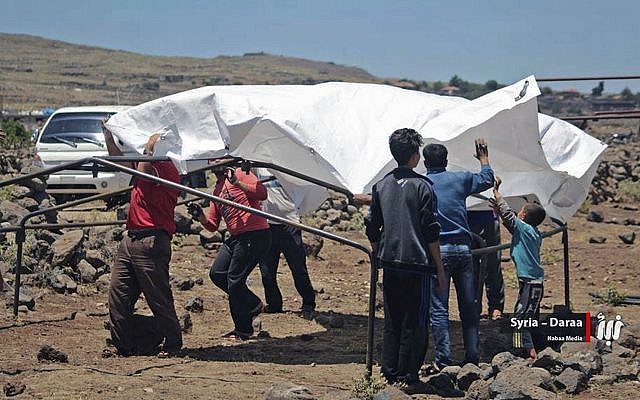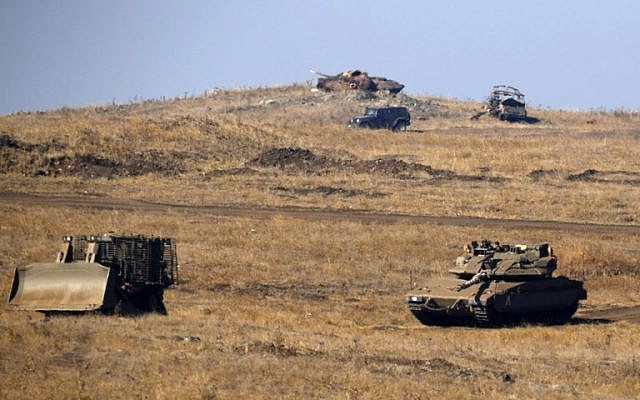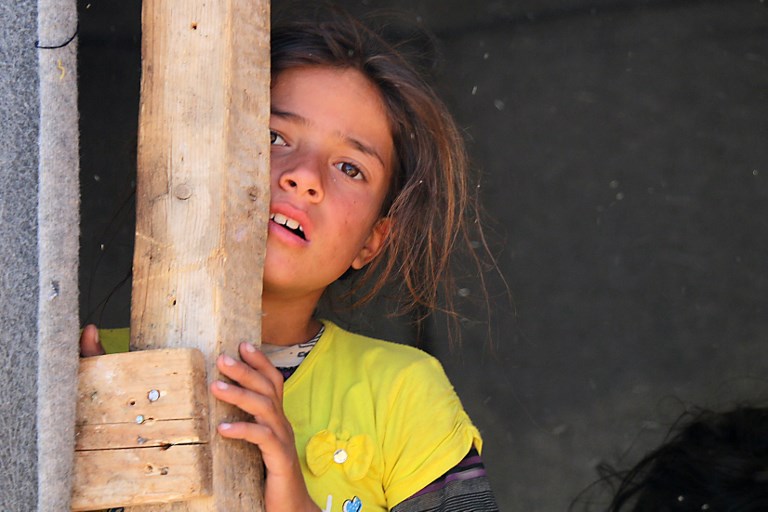As Assad’s army bombards south and displaces more than 50,000, Israel reportedly vows nobody will be allowed in — but prepares to supply humanitarian aid

Israel is preparing for the possibility that an onslaught by the forces of Syrian dictator Bashar Assad could see tens of thousands of Syrian refugees heading for the Israel border. The IDF is gearing up to prevent a mass breach of the frontier, but also to provide humanitarian aid to the displaced, military sources said Thursday.
With Russia’s help, Assad’s army has battered the south for more than a week with air strikes, rocket fire and crude barrel bombs, forcing more than 50,000 people to flee in search of safety. Many of them have fled toward the border with Israel, saying it was the safest since the regime wouldn’t dare strike in that area to avoid angering Jerusalem.
The UN has warned that more than 750,000 lives are at risk in the south, which is meant to be protected by a ceasefire put in place last year by Russia, Jordan and the United States.
Most of the 50,000-plus people who already fled have headed to the sealed Jordanian border. Officials in Nawa, a rebel-held town heavily hit in strikes on Thursday, issued a statement asking Jordan to take in refugees.
But Amman has said the border will remain closed. The kingdom already hosts more than 650,000 registered Syrian refugees and estimates the actual number is closer to 1.3 million.
With Jordan closed, Jerusalem fears they could head to the Israeli border.
While only several dozen refugees had set up tent camps near the Israeli frontier in the town of Quneitra as of Thursday, Israel was preparing for a range of scenarios, the sources said.
One possible development feared by Israel was masses of refugees banding together to try and break through the border fence, Hadashot news reported. Security officials feared that in such a scenario, terrorists could also try to sneak among them into the country.
“No Syrian refugee will enter Israel, but we will help where we can on the humanitarian level,” a senior official was quoted as saying by Channel 10 news.

The nature of that aid was not clear yet, but along with medical and food help, a possibility cited by Channel 10 was Jerusalem being in contact with Moscow to have Russian forces prevent Assad’s troops from massacring civilians.
In recent years, Israel has given extensive humanitarian support to civilians on the Syrian side of the border, who mostly side with the rebels in the Syrian civil war. Israel has provided food and medicine, and thousands of wounded Syrians have entered Israel for life-saving medical treatment.
Israel was also worried that as the fighting gets closer to the border, there could be more mortar shells and other errant fire spilling over into the country, the report said.
The report added that the potential flareup in the north was one of the many reasons Israel was particularly anxious to avoid an escalation of tensions in the Gaza Strip at this time.
On Sunday, the security cabinet will hold a discussion on home front preparedness for the possibility of escalation on the northern front, Channel 10 said. It added that Defense Minister Avigdor Liberman wants his ministry to receive an additional several billion shekels to prepare the home front for war.

Rebels hold a horseshoe-shaped band of territory in the south spanning most of Daraa and Quneitra province to west.
They also control southern districts of the city of Daraa, known as the cradle of Syria’s seven-year uprising.
The rest is held by government forces, who also control most of Sweida province to the east.
Despite an internationally brokered ceasefire in place since 2017, the regime began ramping up bombardment of rebel-held towns in Daraa on June 19.
Russian warplanes began raids on Saturday and on Tuesday the two air forces launched bombing operations against rebel-held neighborhoods of the provincial capital.
A barrage of Russian strikes on rebel-held towns in southern Syria killed 25 civilians on Thursday, the bloodiest day yet of the government’s latest offensive in the strategic region.

Due to the violence, the United Nations said Thursday it had halted cross-border convoys carrying desperately needed aid from Jordan to southern Syria.
“The extremely effective lifeline across the border from Jordan has been discontinued due to the fighting in recent days,” said Jan Egeland, the head of the UN’s Syria humanitarian task-force.
He urged Moscow, Amman and Washington to reestablish the deescalation agreement they hammered out for the area last July, insisting “they can do it again.”
To avoid greater bloodshed, Russia is leading talks involving Syria, Jordan, Israel and the United States, but so far there has been no public progress.
As reported by The Times of Israel
